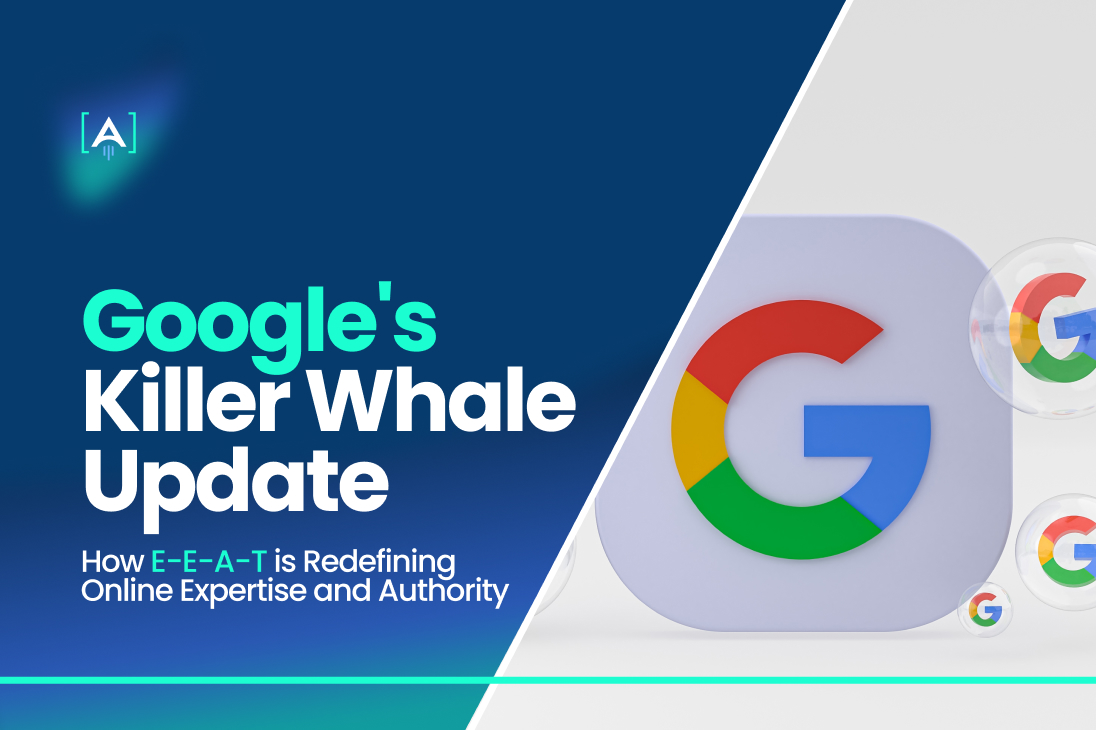In January 2023, Google Search held a global market share of 84.69 percent. But how does Google decide which pages to show first when users search?
Enter the new search age with Google’s latest update, the “Killer Whale” with Google E-E-A-T principles.
This significant development represents a paradigm shift in the evaluation of online content. It emphasizes the principles of E-E-A-T Google.
An experienced SEO agency will help you understand and implement these E-E-A-T principles
In this blog post, we’ll navigate this transformative era and equip you with the necessary tools and strategies to thrive in the evolving search engine land.
What is E-E-A-T?

Google E-E-A-T, which stands for Experience, Expertise, Authoritativeness, and Trustworthiness, is a part of Search Quality Rater Guidelines.
The Killer Whale Update departs from conventional Search Engine Optimization (SEO) tactics such as keyword stuffing.
Instead, it underscores Google’s commitment to prioritizing high-quality, trustworthy content. This shift is driven by advancements in AI in SEO, which enhances how search engines evaluate content relevance and quality.
Natural language processing seo SEO also plays a crucial role in this update, prioritizing content that demonstrates real expertise and trustworthiness.
The Killer Whale Significance in Digital Landscape
Search quality guidelines update offers content creators an opportunity to enhance their work by showcasing depth of knowledge, real-world experience, and a commitment to providing accurate and unbiased information.
Adherence to the Google E-E-A-T principles can increase visibility, boost credibility, and bring a more dedicated audience.
Exploring the nuances of the E-E-A-T Google reveals its profound impact on search engines’ creation, consumption, and ranking of content.
This positive change in the digital landscape will help users find high-quality, reliable information.
Unraveling E-E-A-T: The Essence of Killer Whale

At the heart of the Killer Whale Update lies the E-E-A-T Google framework. It’s a set of core principles that Google’s quality raters use to assess content quality.
Let’s break down each element to understand what they’re all about:
Experience
What makes the content genuinely exciting and unique? Author’s experience.
Social media posts are more engaging when content creators share their firsthand experiences.
They connect with the audience more deeply. Readers feel like they’re getting user-generated content, not just generic information.
Let’s say someone searches for orthopedic shoes. The odds are high that he would stop at your website if he finds relatable information about the shoes.
If the content creators literally lived in those shoes, they wouldn’t describe the shoes simply and generically. They would hit the target and make the user purchase.
This is all about experiencing what you’re selling.
Expertise
Search quality raters must figure out if authors know what they write about. This is similar to Experience, but not the same.
Expertise is more than just knowing facts; it’s delving deep into a particular topic and mastering it.
It showcases a comprehensive understanding backed by credentials and a proven knowledge-sharing history.
For instance, an entrepreneur is looking for expert tips for their startup to get funded.
Of course, he can find overwhelming information on the Internet. While these resources may provide some insights, they often lack the depth and expertise.
The user will stop and read your article if you’re accredited in the startup landscape.
Authoritativeness
Authoritativeness is getting the nod of approval and respect for your expertise.
It means people see you as a thought leader, influencer, or someone they can trust for reliable information.
How do Google quality raters evaluate your website as an authoritative or trustworthy source?
Usually, it comes from others in your field recognizing your expertise, getting published and cited, and having a solid track record of dishing out top-notch content.
Advanced SEO techniques help build and reinforce this authority. Strategies like creating high-quality content, engaging in strategic link-building, and performing a technical SEO audit ensure that your site meets the rigorous standards set by search engines.
Trustworthiness
Trustworthiness is the cornerstone of Google E-E-A-T. It shows how reliable and credible a content creator is.
It’s all about creating a name for yourself as someone accurate, objective, and committed to giving out information without bias.
You earn trust by sticking to ethical principles, consistently delivering precise content, and ensuring you always have your audience’s best interests at heart.
Experience Takes the Front Seat: The “E” Factor in SEO

Previously, Google’s quality rater guidelines covered EAT (Expertise, Authoritativeness, and Trustworthiness). Then Google added an extra “E” to the guideline for “Experience.
The Killer Whale Update now emphasizes the “Experience” factor, saying real-world know-how is gold in content creation.
In the past, Google’s algorithms mainly focused on keyword usage and technical SEO factors.
But now, with fake news on the rise, Google gives more importance to how trustworthy and experienced content creators are.
Why is Experience Important for SEO?

Google aims to ensure that users can find high-quality, trustworthy content relevant to their search queries.
By emphasizing Experience, Google prioritizes content created by individuals who have a deep understanding of their subject matter and can provide valuable insights to readers.
How to Showcase Your Experience in Online Content
Content creators can showcase their Experience to improve their SEO rankings.
Here are a few tips:
- Highlight your credentials and Experience. Include your education, certifications, and relevant work experience in your author bio or website.
- Share case studies and examples of your work. Provide concrete examples of your success in your field.
- Use data and evidence to support your claims. Back up your assertions with data, statistics, and other forms of proof.
- Get involved in your industry. Participate in online discussions, attend conferences, and contribute to industry publications.
- Build relationships with other experts in your field. Collaborate on projects, guest blog on each other’s sites, and cross-promote each other’s work.
- Use storytelling to connect with your audience. Share personal anecdotes and experiences to make your content more engaging and relatable.
- Be transparent about your biases and limitations. Acknowledge your areas of expertise and acknowledge any areas where you may not be an expert.
Elevating Expertise: Crafting Content that Speaks Volumes

Establishing yourself as an expert in your niche is crucial for garnering credibility and attracting a loyal audience.
For instance, a software engineer with a history of being innovative and a deep understanding of programming languages demonstrates expertise.
Their tutorials and articles, with practical tips and real-world examples, empower others to navigate the complexities of technology.
Tips for Demonstrating Expertise in Various Niches
Regardless of your niche, there are universal strategies that can help you establish yourself as an expert:
Immerse Yourself in Your Niche: Expertise is a continuous journey of learning and exploration. Dedicate yourself to understanding the nuances of your niche, staying up-to-date with the latest trends, and engaging in ongoing research and development.
Pursue Credible Credentials: Formal education, certifications, and professional affiliations are powerful indicators of your expertise. Pursue relevant credentials that validate your knowledge and demonstrate your commitment to professional development.
Showcase Your Work: Let your work speak for itself. Share case studies, examples of your projects, and testimonials from satisfied clients or collaborators. Put your expertise into action and demonstrate your ability to deliver tangible results.
Authority Redefined: Building a Stronger Online Presence

Before the Killer Whale update, Authority was often determined by a website’s backlink profile, domain authority, and search engine rankings.
However, these factors alone no longer guarantee a position of authority.
Google now wants to ensure that experts create informative, valuable content published on trustworthy websites.
AI overviews are now a significant factor in how Google assesses content quality. This tool helps by summarizing and highlighting high-quality, trustworthy information, aligning with the new authority standards.
Looking ahead, future SEO trends emphasize the importance of creating content that is both valuable and relevant.
Steps to Enhance the Authoritativeness of Websites and Authors
To thrive in this new era of authority, website owners and content creators must adapt their strategies.
Here are some practical steps to enhance the authoritativeness of websites and authors:
- Engage Skilled Experts: Strengthen your team by hiring professionals with proven expertise in your industry. Their knowledge and experience will elevate the quality of your work.
- Craft a Dynamic Website: Develop a responsive website that adapts to different devices. A user-friendly online presence enhances accessibility and engagement.
- Establish Brand Recognition: Make your brand more visible through strategic marketing and awareness campaigns. A well-known brand name builds trust and attracts a loyal audience.
- Leverage Credible Resources: Use authoritative sources to verify and enhance the credibility of your content.
Trustworthiness: The Bedrock of Online Credibility

In today’s digital world, where information is abundant, trustworthiness has become the cornerstone of online credibility.
When a website or author establishes trust, it attracts a loyal audience and opens doors to new opportunities and collaborations.
Techniques for Establishing and Maintaining Trust in the Age of Misinformation
Transparency: Be open and transparent about your website’s ownership, purpose, and funding sources. Clearly state your editorial policies, conflict of interest disclosures, and any potential biases.
This openness fosters trust and allows your audience to make informed decisions about the information they consume.
Accuracy: Ensure your website’s content is accurate, up-to-date, and free from errors. People don’t trust websites with minimal customer service information.
Verify information from credible sources, cite your references, and correct any mistakes promptly.
User Feedback: Encourage user feedback and engagement by providing easy-to-use comment sections, polls, and surveys.
Actively respond to feedback, address concerns, and improve your content based on user input.
SEO in the Age of Killer Whale: Adapting Your Strategy

The Killer Whale Update was a paradigm shift in the SEO community, emphasizing the significance of Experience, Expertise, Authoritativeness, and Trustworthiness (E-E-A-T) in content creation.
It’s crucial to adapt your SEO strategies to align with these new guidelines.
Aligning Your SEO Strategy with E-E-A-T
Here are key strategies for adapting your SEO approach to the E-E-A-T Google.
- Prioritize Content Quality Over Keyword Stuffing: Keyword stuffing can make content less helpful and engaging for readers. Focusing on content quality ensures your audience gets valuable information.
- Establish Expertise: Demonstrate your expertise in your niche by showcasing your credentials, experience, and in-depth knowledge. Share case studies, participate in industry discussions, and contribute to thought leadership initiatives. Use SEO automation tools to simplify the process of publishing and managing authoritative content.
- Build Authoritativeness: Earn recognition from peers and industry leaders. Participate in professional organizations, speak at conferences, and contribute to reputable publications.
- Foster Trustworthiness: Maintain transparency and accuracy in your content. Cite sources appropriately, disclose biases, and avoid making unsubstantiated claims. Implementing programmatic SEO ensures that your content is consistently high-quality and adheres to E-E-A-T principles, enhancing your trustworthiness in the eyes of both users and search engines.
Tools and Techniques for Optimizing Content for E-E-A-T

Several tools and techniques can help you optimize your content for E-E-A-T Google:
Content Quality Analysis Tools: Use tools like Grammarly and Hemingway Editor to assess the clarity, conciseness, and overall quality of your writing.
Credibility Assessment Tools: Use tools like BuzzSumo and Mention to track your content’s social media engagement and authority.
Fact-Checking Tools: Employ tools like Copyscape and Google Fact Check Explorer to verify the accuracy and authenticity of your information.
Plagiarism Detection Tools: Leverage tools like Grammarly’s plagiarism checker for creating original and unique content.
Audience Feedback Tools: Use surveys, polls, and social media interactions to gather your audience’s feedback and identify improvement areas.
Navigating the Challenges: Pitfalls and Opportunities of E-E-A-T

Content creators will inevitably encounter challenges as they adapt to the new Google E-E-A-T-driven landscape.
However, they can transform these challenges into opportunities for growth and visibility.
Common Challenges in Adapting to the Killer Whale Update
Shifting Focus from Quantity to Quality: Moving away from keyword-stuffed content and prioritizing quality writing requires a mindset shift and a willingness to invest more time and effort into content creation. Implementing schema markup SEO can help structure your content more effectively, making it easier for search engines to understand and prioritize your high-quality content.
Demonstrating Expertise: Establishing expertise in a niche often requires years of experience, education, and ongoing professional development. Newer content creators may face challenges in showcasing their credibility.
Building Authoritativeness: Gaining recognition and respect within a niche takes time and consistent effort. Content creators may need to participate in industry events actively, contribute to publications, and build relationships with peers.
Maintaining Trustworthiness: Ensuring content’s accuracy, objectivity, and transparency requires diligence and a commitment to ethical practices. Content creators must be mindful of biases and avoid making unsubstantiated claims.
Turning Challenges into Opportunities for Growth and Visibility
Content creators can navigate the complexities of the Killer Whale through insightful approaches and a commitment to excellence.
- Embrace the Learning Curve: View the challenges as opportunities to deepen your knowledge and expertise in your niche. Engage in continuous learning, attend workshops and network with experienced professionals.
- Contribute to Industry Discussions: Participate in online forums, social media groups, and industry events. Share your knowledge, engage in discussions, and build relationships with thought leaders.
- Emphasize Transparency and Accuracy: Cite sources appropriately, disclose biases, and promptly correct errors. Maintain open communication with your audience and address their feedback constructively.
- Seek Feedback and Continuously Improve: Regularly request feedback from your audience through surveys, polls, and social media interactions. Use this feedback to identify areas for improvement and refine your content strategy.
Looking Ahead: The Future of Google Updates and SEO

SEO is heading towards a future that prioritizes a user-focused, ethical, and technologically advanced strategy.
In the future, SEO will continue to meet users’ queries using more advanced strategies.
This shift is fueled by the increasing influence of AI (artificial intelligence) in search engines.
Google’s emphasis on E-E-A-T promotes creating ethical, high-quality content. Additionally, the integration of AI-generated content is shaping SEO to be more interactive.
Recognizing and adapting to these trends is vital for achieving higher rankings, increased traffic, and enhanced connections with potential customers.
Predicting Future Trends in Google’s Algorithm Updates
In a 2022 survey of SEO professionals worldwide, 11.3% said that machine learning/AI would be a key factor affecting search rankings in the next two years. Additionally, 9.8% mentioned Mobile SEO.
Based on present patterns and industry insights, potential shifts in Google’s algorithm updates may unfold in the following ways:
Intent-Driven Search: Google’s emphasis on grasping user intent is poised to grow, prioritizing content that aligns with keywords and deeply comprehends the searcher’s underlying needs and motivations.
User Engagement Metrics: Google will continue to give importance to user engagement metrics like dwell time, bounce rate, and click-through rates to assess content quality and relevance.
Emerging Technologies: Google consistently explores and integrates cutting-edge technologies, including artificial intelligence (AI) and natural language processing (NLP), to elevate its search capabilities. SEO strategies should adapt to leverage these technologies effectively.
Google E-E-A-T Principles: The search ranking systems will continue to focus on Experience, Expertise, Authoritativeness, and Trustworthiness (E-E-A-T). It will remain fundamental in Google’s content assessment, favoring authoritative and trustworthy sources.
Mobile-First Indexing: Mobile-first indexing will continue to rise in prominence, ensuring content optimization for mobile devices and a seamless user experience across all platforms. Your website’s visibility in Google search rankings depends on relevance and user experience.
Search Generative Experience (SGE) will transform search engines into dynamic, AI-driven platforms offering personalized summaries, interactive visuals, and conversational interfaces. SEO strategies must adapt to prioritize rich, adaptable content and cater to evolving user intents in this immersive, AI-fueled search landscape.
Embracing the Tide of Change

Undoubtedly, Google’s Killer Whale Update has changed online expertise and authority. By prioritizing Experience, Expertise, Authoritativeness, and Trustworthiness (E-E-A-T), Google adopts a more comprehensive approach to content creation and website assessment.
By embracing this shift and adopting Google E-E-A-T principles at the heart of their content creation and website management strategies, website owners, SEO professionals, and content creators can succeed in the ever-evolving digital landscape.
Remember, the key to success in the age of E-E-A-T Google is creating valuable content, demonstrating expertise, establishing trustworthiness, and adapting to the ever-changing tide of search engine algorithms.

